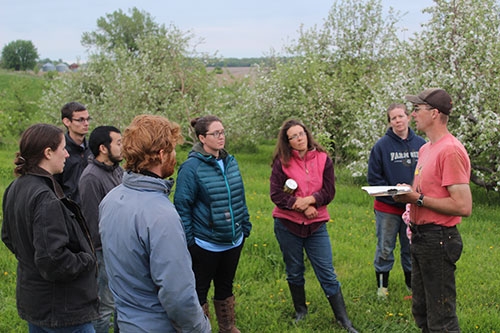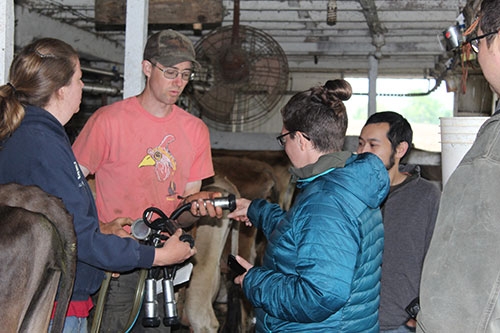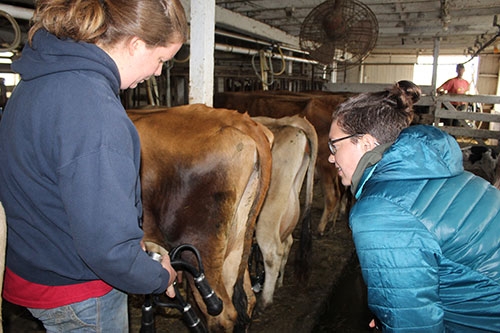You are here
Home ›Peake Orchards and Dairy hosts the Northeast Iowa Food and Farm Network

Peake Orchards and Dairy ... A group touring the orchard is pictured above. Jeremy and Jodi Peake, pictured below, show Dayna Burtness and Nick Nguyen the suction of the milking machine. Submitted photos.


Touring the dairy facility ... Jodi Peake, pictured above, showing a milker to Dayna Burtness. Submitted photo.
Rain showers stayed at bay to provide a small group of local farmers with a beautiful evening tour of Peake Orchards and Dairy Sunday, May 20. Jeremy and Jodi Peake and their daughters Molly and Leah hosted the farm tour.
Some of the group arrived early to see milking in progress in the tie-stall barn, which was an opportunity for experiential learning. Many of the attendees specialized in other farming systems including vegetable production or small livestock, so there were many in-depth questions about how the dairy production system works from start to finish.
Jeremy shared that he selects his herd (mainly Jerseys and some Ayrshire genetics) to succeed in their grazing system, where the cows are never fed any grain. They milk year-round, utilizing baleage and hayleage over the winter months. The herd of around 40 milking cows are moved to fresh pastures 3-4 times per day, and are milked twice per day.
In addition to regular milk-testing, Peake’s milk is occasionally texted for CLA (conjugated linoleic acid) and Omega-3, fatty acids that show up in grass-fed meat and milk. The Peakes are members of CROPP cooperative, and their milk is sold as part of the Organic Valley Grassmilk program, which has a $4.00/cwt premium above organic milk.
The Peakes started milking in 2001, and switched to organic, becoming members of the CROPP cooperative, in 2006. Jeremy and Jodi credit that opportunity with helping their farm stay in business with a smaller herd size.
Guests wondered about the different use of products and systems in the organic dairy versus a non-organic dairy. Jeremy shared that they can’t use antibiotics or growth hormones, they must feed organically-certified forage, and that there are even some substances like teat dips that they are not allowed to use.
In addition to selecting cows that do well in the grazing system, Jeremy has also been selecting for cows that produce A2 milk. Cows carry genes that affect the type of casein (a protein) present in their milk. While many cows produce the A1 beta-casein, the A2 beta-casein is digested differently by people. A2 milk has therefore become popular in New Zealand, Australia, and Europe, where it has been separately packaged and labelled, and where consumers who experience indigestion or milk intolerance are choosing to try A2 milk. These days, those genetic traits are included in data about sires, and Jeremy has chosen to artificially inseminate his cows to bulls that have A2 genetics.
After seeing the systems for cooling the milk, cleaning the milkers and equipment, and of course, feeding some baby calves, the group watched the cows get a fresh break of pasture before heading out to the apple orchard.
In the orchard, Jodi and Jeremy shared its long history. Started by Jeremy’s father Al in the 1980’s, The orchard has grown to include more varieties (including the newest, Honeycrisp).
With 1,000 trees, the orchard is an additional enterprise that keeps the family busy from from late August through mid-November. The apples are sold locally at the Winneshiek Farmers Market, the Oneota Coop and at the farm. They have also marketed some apples to a cidery near the Twin Cities, where they were turned into hard cider.
The apple orchard involves a lot of labor; first the apples are hand-picked, then sorted and graded, and weighed and bagged, and finally they are ready to be marketed at the farmers market stand, the farm store, and the grocery store. In addition, the trees must be maintained and pruned to allow sun to penetrate the canopy and ripen the fruit.
Apple harvest time brings guests to the farms, and the Peakes treat folks to apple pie tasting, hay wagon rides to the orchard, and the opportunity to paint pumpkins and enjoy fall activities. They say they’ve noticed some of the consumer focus changing over the years; in the 80’s, people wanted to come purchase apples in bulk for canning or other activities. They were more interested in quantity and price, and less interested in the experience and the production methods.
Today, more of the farm’s guests want to experience the orchard and bring their family out to enjoy fall on the farm. They are also more interested in the farm’s production practices.
The Northeast Iowa Food and Farm Network certainly enjoyed their experience; they capped off the evening with a potluck including the best spring delicacies - asparagus, rhubarb, and of course, fresh milk from cows on green pasture.
The Peake Farm is located at 323 North Line Drive, Waukon, IA. If you’d like to learn more about Peake Orchards and find their products, check out “Peake Orchards” on Facebook.
The Northeast Iowa Food and Farm Network is a casual gathering of local food, beginning, and transitioning farmers making connections, finding common interests, collaborating, and learning together. Whether you’re a farmer or a curious eater, all are welcome. Contact Kayla Koether koether@iastate.edu for more information.

